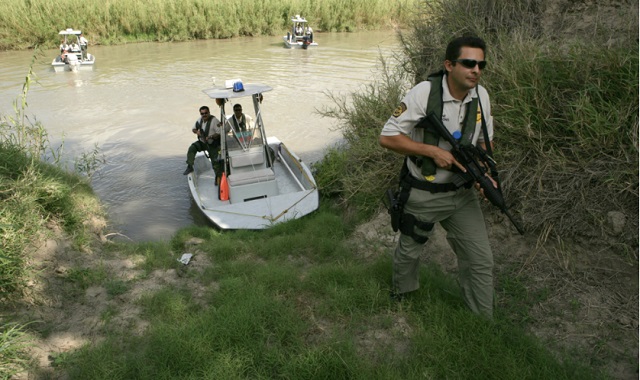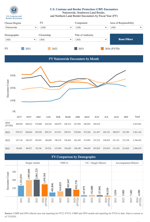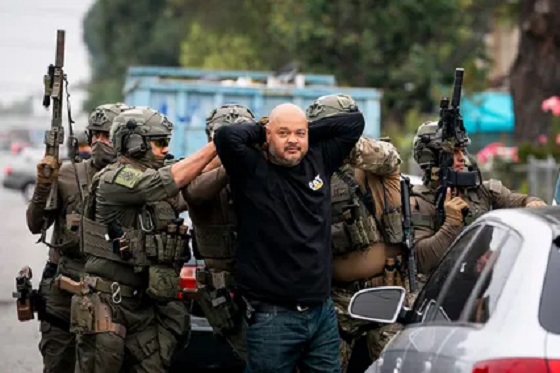illegal immigration
More than 205,000 illegal border crossers in June, 2.5 million in fiscal 2024

Border Patrol agents inspect a potential landing spot for illegal immigrants along the Rio Grande River in Texas.
From The Center Square
By
There were more than 205,000 illegal border crossers apprehended in June, according to new U.S. Customs and Border Protection data released on Monday.
June’s numbers bring the total number of illegal border crossers this fiscal year to more than 2.4 million.
The majority of illegal border crossers were apprehended at the southwest border last month, totaling more than 130,000. Fiscal year to date, more than 1.82 million were apprehended at the southwest border.
At the northern border, more than 17,700 were apprehended last month, the greatest number apprehended for the month of June in U.S. history. Nearly 145,000 have been apprehended at the northern border this fiscal year.
The fiscal year goes from Oct. 1 to Sept. 30.
The overwhelming majority of illegal border crossers were single adults, as they have been every month. Fiscal year through June, more than one million single adults illegally entered the country, according to the data. The next greatest number of illegal border crossers for the fiscal year totals nearly 700,000 of individuals claiming to be in a family unit.

When reporting the data, CBP said, “Border Patrol encounters between ports of entry were 29% lower than in May 2024 and were the lowest monthly total for the Border Patrol along the southwest border since January 2021 as well as lower than the number of encounters between ports of entry in June 2019.”
U.S. House Committee on Homeland Security Chairman Mark Green, R-Tenn., disagreed, arguing last month’s numbers were just “another month, another devastating number of inadmissible aliens entering and being released into the United States – all at the invitation of President Biden and now-impeached DHS Secretary Alejandro Mayorkas.”
Green led the charge to impeach Mayorkas on grounds he failed to secure the border. Mayorkas in February was the first sitting cabinet member to be impeached in U.S. history, The Center Square reported.
CBP official Troy Miller said the decrease in illegal border crossings was due to “recent border security measures” that made “a meaningful impact on our ability to impose consequences for those crossing unlawfully.”
Miller is performing the duties of commissioner after CBP’s former commissioner, Chris Magnus, was forced to resign in November 2022 after being on the job for 11 months. Magnus resigned after being widely criticized for his handling of an influx of illegal border crossers and after numerous officials complained, including the Arizona Sheriff’s Association, which had warned that he was unqualified and opposed his nomination, The Center Square reported.
Miller claimed because of a new rule issued by Mayorkas, the number of encounters at the southwest border decreased by more than 50% in the past six weeks.
But Green and others argue that, because of new parole programs Mayorkas created, monthly encounters at ports of entry of foreign nationals with no lawful basis to enter increased exponentially under the Biden administration, from nearly 20,000 in January 2021 to more than 117,000 in June 2024.
The total number, which has traditionally measured entry between ports of entry and at ports of entry, does not fully reflect the number of foreign nationals illegally entering the country because of the parole programs, critics argue. Hundreds of thousands have been flown in using a newly created CBP One mobile app, for example.
Nearly 42,000 foreign nationals were brought into the country last month through the app, according to CBP data. Since it was launched in January 2023, more than 680,500 foreign nationals used it to schedule appointments and arrive at ports of entry.
The Biden administration strategy “should now be plain to everyone: flood the country with as many illegal aliens as possible between ports of entry, and then create unlawful mass-parole programs like CBP One and CHNV to encourage otherwise-inadmissible aliens to still enter – just in a less politically embarrassing and damaging way,” Green said.
In addition to the app, Mayorkas also created and expanded parole programs (CHNV) specifically to allow Cuban, Haitian, Nicaraguan and Venezuelan nationals to enter the country who under the law are not permitted to enter. So far, “about 494,799” arrived on commercial flights and were granted parole through the CHNV parole process, according to CBP data.
They include 106,757 Cubans, 205,026 Haitians, 93,325 Nicaraguans, and 118,706 Venezuelans who were “vetted and authorized for travel,” CBP says. Among them, 104,130 Cubans, 194,027 Haitians, 86,101 Nicaraguans, and 110,541 Venezuelans were granted parole and released into the U.S.
The CHNV parole process has been directly linked to violent crimes being committed against Americans, as reports indicate those being released were not being properly vetted, if at all, The Center Square reported. Despite CBP’s claims, DHS Inspector General reports found Border Patrol agents weren’t vetting everyone apprehended and released and ICE agents weren’t detaining them.
illegal immigration
US Notes 2.5 million illegals out and counting

President Trump’s Department of Homeland Security is marking what officials are calling a landmark moment in U.S. immigration enforcement, announcing Wednesday that more than 2.5 million illegal aliens have now left the country since Trump returned to the Oval Office in January. DHS Secretary Kristi Noem said the surge reflects a sweeping, sustained crackdown driven by Immigration and Customs Enforcement teams that — according to internal tallies — have already removed more than 605,000 illegal aliens, most of whom were facing criminal charges or carrying prior convictions. Nearly two million more have opted to self-deport, a wave Noem attributes to stepped-up enforcement and the administration’s aggressive public messaging. She again urged those still in the country illegally to use the government’s CBP Home app, which offers a free one-way flight and a $1,000 stipend to expedite departure.
Senior DHS officials say arrests have climbed as well, with almost 600,000 illegal aliens taken into custody since January 20. “Illegal aliens are hearing our message to leave now,” DHS official McLaughlin said this week. “They know if they don’t, we will find them, we will arrest them, and they will never return.”
The administration argues the impact is being felt far beyond immigration courts and detention facilities, pointing to the U.S. housing market as one of the clearest signs of change. For six straight months, DHS says not a single illegal alien has been released into the interior from the southern border — a dramatic shift after years of mass inflows under President Biden. That decline, they say, is finally filtering into rent and home-price data after years of punishing increases.
Housing and Urban Development Secretary Scott Turner said Americans have now seen four consecutive months of rent decreases — the first sustained drop in years — as fewer illegal aliens compete for housing. Vice President JD Vance emphasized the connection even more bluntly: “The connection between illegal immigration and skyrocketing housing costs is as clear as day. We are proud to be moving in the right direction. Still so much to do.”
Research abroad and at home backs up the administration’s argument. Economists in Denmark released findings earlier this year showing that a one-percentage-point rise in local immigration over a five-year period drove private rental prices up roughly 6 percent and home prices up about 11 percent. The Center for Immigration Studies presented similar data to Congress last year, with researcher Steven Camarota testifying that a 5-percentage-point increase in a metro area’s recent-immigrant share was tied to a 12-percent rise in rent for U.S.-born households.
As DHS leaders frame it, Trump’s second-term enforcement machine is reshaping both border policy and household budgets — an approach they say is finally delivering relief to Americans who spent years squeezed by soaring housing costs and unchecked migration.
illegal immigration
EXCLUSIVE: Canadian groups, First Nation police support stronger border security

First Nation police chiefs join Texas Department of Public Safety marine units to patrol the Rio Grande River in Hidalgo County, Texas. L-R: Dwayne Zacharie, President of the First Nations Chiefs of Police Association, Ranatiiostha Swamp, Chief of Police of the Akwesasne Mohawk Territory, Brooks County Sheriff Benny Martinez, Jamie Tronnes, Center for North American Prosperity and Security, Goliad County Sheriff Roy Boyd. Photo: Bethany Blankley for The Center Square
From The Center Square
By
Despite Canadian officials arguing that the “Canada-U.S. border is the best-managed and most secure border in the world,” some Canadian groups and First Nation tribal police chiefs disagree.
This week, First Nation representatives traveled to Texas for the first time in U.S.-Canadian history to find ways to implement stronger border security measures at the U.S.-Canada border, including joining an Operation Lone Start Task Force, The Center Square exclusively reported.
Part of the problem is getting law enforcement, elected officials and the general public to understand the reality that Mexican cartels and transnational criminal organizations are operating in Canada; another stems from Trudeau administration visa policies, they argue.
When it comes to public perception, “If you tell Canadians we have a cartel problem, they’ll laugh at you. They don’t believe it. If you tell them we have a gang problem, they will absolutely agree with you 100%. They don’t think that gangs and cartels are the same thing. They don’t see the Hells Angels as equal to the Sinaloa Cartel because” the biker gang is visible, wearing vests out on the streets and cartel operatives aren’t, Jamie Tronnes, executive director of the Center of North American Prosperity and Security, told The Center Square in an exclusive interview.
The center is a US-based project of the MacDonald-Laurier Institute, the largest think tank in Canada. Tronnes previously served as a special assistant to the cabinet minister responsible for immigration and has a background in counterterrorism. She joined First Nation police chiefs to meet with Texas law enforcement and officials this week.
Another Canadian group, Future Borders Coalition, argues, “Canada has become a critical hub for transnational organized crime, with networks operating through its ports, banks, and border communities.” The Sinaloa and Jalisco New Generation Mexican cartels control the fentanyl, methamphetamine and cocaine business in Canada, partnering with local gangs like the Hells Angels and Chinese Communist Party (CCP)-linked actors, who launder profits through casinos, real estate, and shell companies in Vancouver and Toronto, Ammon Blair, a senior fellow at the Texas Public Policy Foundation, and others said at a coalition event prior to First Nation police chiefs and Tronnes coming to Texas.
“The ’Ndrangheta (Italian Mafia) maintains powerful laundering and import operations in Ontario and Quebec, while MS-13 and similar Central American gangs facilitate human smuggling and enforcement. Financial networks tied to Hezbollah and other Middle Eastern groups support laundering and logistics for these criminal alliances,” the coalition reports.
“Together, they form interconnected, technology-driven enterprises that exploit global shipping, cryptocurrency, and AI-enabled communications to traffic whatever yields profit – narcotics, weapons, tobacco, or people. Taking advantage of Canada’s lenient disclosure laws, fragmented jurisdictions, and weak cross-border coordination, these groups have embedded themselves within legitimate sectors, turning Canada into both a transit corridor and safe haven for organized crime,” the coalition reports.
Some First Nation reservations impacted by transnational crime straddle the U.S.-Canada border. One is the Akwesasne Mohawk Reservation, located in Ontario, Quebec, and in two upstate New York counties, where human smuggling and transnational crime is occurring, The Center Square reported. Another is the Tsawwassen First Nation (TWA) Reservation, located in a coastal region south of Vancouver in British Columbia stretching to Point Roberts in Washington state, which operates a ferry along a major smuggling corridor.
Some First Nation reservations like the TWA are suffering from CCP organized crime, Tronnes said. Coastal residents observe smugglers crossing their back yards, going through the reserve; along Canada’s western border, “a lot of fentanyl is being sent out to Asia but it’s also being made in Canada,” Tronnes said.
Transnational criminal activity went largely unchecked under the Trudeau government, during which “border security, national security and national defense were not primary concerns,” Tronnes told The Center Square. “It’s not to say they weren’t concerns, but they weren’t top of mind concerns. The Trudeau government preferred to focus on things like climate change, international human rights issues, a feminist foreign policy type of situation where they were looking more at virtue signaling rather than securing the country.”
Under the Trudeau administration, the greatest number of illegal border crossers, including Canadians, and the greatest number of known, suspected terrorists (KSTs) were reported at the U.S.-Canada border in U.S. history, The Center Square first reported. They include an Iranian with terrorist ties living in Canada and a Canadian woman who tried to poison President Donald Trump, The Center Square reported.
“Had it been a priority for the government to really crack down and provide resources for national security,” federal, provincial and First Nation law enforcement would be better equipped, funded and staffed, Tronnes said. “They would have better ways to understand what’s really happening at the border.”
In February, President Donald Trump for the first time in U.S. history declared a national emergency at the northern border and ordered U.S. military intervention. Months later, his administration acknowledged the majority of fentanyl and KSTs were coming from Canada, The Center Square reported.
Under a new government and in response to pressure from Trump, Canada proposed a $1.3 billion border plan. However, more is needed, the groups argue, including modernizing border technology and an analytics infrastructure, reforming disclosure and privacy rules to enable intelligence sharing, and recognizing and fully funding First Nation police, designating them as essential services and essential to border security.
“National security doesn’t exist without First Nation policing at the border,” Dwayne Zacharie, First Nations Chiefs of Police president, told The Center Square.
-

 International20 hours ago
International20 hours agoGeorgia county admits illegally certifying 315k ballots in 2020 presidential election
-

 Business2 days ago
Business2 days agoICYMI: Largest fraud in US history? Independent Journalist visits numerous daycare centres with no children, revealing massive scam
-

 Alberta2 days ago
Alberta2 days agoAlberta project would be “the biggest carbon capture and storage project in the world”
-

 Energy1 day ago
Energy1 day agoCanada’s debate on energy levelled up in 2025
-

 Haultain Research22 hours ago
Haultain Research22 hours agoSweden Fixed What Canada Won’t Even Name
-

 Business21 hours ago
Business21 hours agoWhat Do Loyalty Rewards Programs Cost Us?
-

 Business1 day ago
Business1 day agoSocialism vs. Capitalism
-

 Energy2 days ago
Energy2 days agoNew Poll Shows Ontarians See Oil & Gas as Key to Jobs, Economy, and Trade





